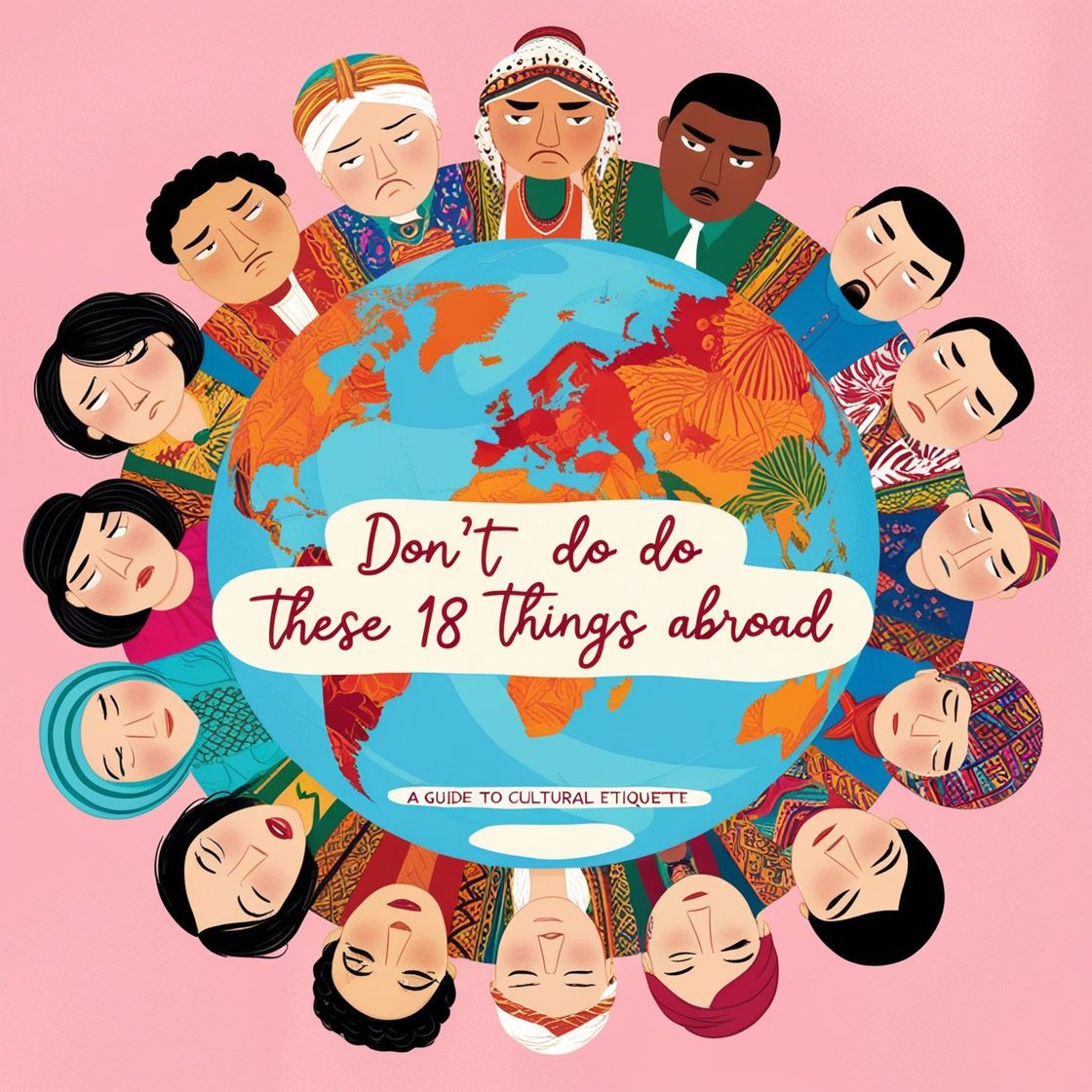Written by Saad
- Don't Do These 18 Things Abroad: A Guide to Cultural Etiquette
- 1. France: Don't Talk or Ask About Money
- 2. Ukraine: Don't Give an Even Number of Flowers
- 3. New Zealand: Don't Honk, Otherwise, You'll Insult People
- 4. India: Don't Touch the Opposite Sex in Public
- 5. Japan: Don't Leave Tips
- 6. Mexico: Don't Get Offended at Locals' Jokes
- 7. Norway: Don't Ask About Going to Church
- 8. Turkey: Don't Show the OK Gesture
- 9. UK: Don't Ask How Much People Earn
- 10. Ireland: Don't Try to Imitate the Irish Accent
- 11. Germany: Don't Congratulate on Birthdays Before the Day
- 12. Kenya: Don't Call People by Their First Name
- 13. Chile: Don't Eat With Your Hands
- 14. Singapore: Don't Eat in Public Transport
- 15. USA: Don't Forget to Leave Tips
- 16. Italy: Don't Order Cappuccino in Restaurants
- 17. Hungary: Don't Clink Glasses When Toasting
- 18. China: Don't Give a Clock or Umbrella as a Present
- Conclusion

Don’t Do These 18 Things Abroad: A Guide to Cultural Etiquette
Being mindful of cultural customs and etiquette is important while traveling overseas to show respect and have a pleasant experience without causing offense to the local people. This guide offers information on 18 practices to steer clear of in various countries globally.
1. France: Don’t Talk or Ask About Money
In France, discussing finances is considered impolite. Asking someone how much they earn or talking about your own financial status can come across as crude and invasive. It’s best to steer clear of monetary topics in casual conversations.
2. Ukraine: Don’t Give an Even Number of Flowers
In Ukraine, giving an even number of flowers is associated with funerals and mourning. When presenting flowers as a gift, always opt for an odd number to avoid unintentionally causing discomfort or sadness.
3. New Zealand: Don’t Honk, Otherwise, You’ll Insult People
Honking in New Zealand is generally reserved for emergencies. Using your car horn unnecessarily is seen as rude and aggressive. It’s important to drive calmly and respect the quiet atmosphere on the roads.
4. India: Don’t Touch the Opposite Sex in Public
India has a conservative approach to public displays of affection, especially between the opposite sexes. Touching or showing affection in public is frowned upon and can lead to uncomfortable situations, especially in more traditional areas.
5. Japan: Don’t Leave Tips
In Japan, the act of leaving a tip may be perceived as offensive rather than as a gesture of gratitude. The Japanese culture places significant emphasis on the pride associated with one’s work, leading to the belief that the quality of service should inherently meet high standards without the expectation of extra financial compensation. To express appreciation, a straightforward “thank you” or “arigatou gozaimasu” suffices.
6. Mexico: Don’t Get Offended at Locals’ Jokes
Mexicans have a strong sense of humor that often includes sarcasm and playful teasing. It’s important not to take these jokes personally. Laugh along, and you’ll likely find yourself in good spirits with the locals.
7. Norway: Don’t Ask About Going to Church
In Norway, matters of faith are regarded as personal, and inquiring about an individual’s church attendance or religious convictions may be perceived as intrusive. Therefore, it is advisable to refrain from introducing religious topics in informal discussions.
8. Turkey: Don’t Show the OK Gesture
The “OK” hand gesture, where the thumb and forefinger form a circle, is highly offensive in Turkey, as it has a vulgar connotation. To avoid misunderstandings, it’s best to refrain from using this gesture altogether.
9. UK: Don’t Ask How Much People Earn
In the UK, asking about someone’s salary is seen as impolite and intrusive. British people tend to keep their financial matters private, so it’s best to avoid this topic unless the person brings it up themselves.
10. Ireland: Don’t Try to Imitate the Irish Accent
Imitating the Irish accent may be perceived as condescending or derisive. Although numerous individuals of Irish descent possess a robust sense of humor, it is generally more respectful to admire their accent without attempting to replicate it.
11. Germany: Don’t Congratulate on Birthdays Before the Day
Wishing someone a happy birthday in advance of their actual birthday is frowned upon in Germany. It is best to save your congratulations until the day of the birthday in order to avoid giving them away too soon.
12. Kenya: Don’t Call People by Their First Name
In Kenya, using someone’s first name too soon can be considered disrespectful, especially in formal settings or when addressing elders. It’s advisable to use titles and last names until invited to use the first name.
13. Chile: Don’t Eat With Your Hands
In Chile, using utensils is the norm, even for foods that are often eaten with hands elsewhere, like pizza. Eating with your hands can be seen as bad manners, so make sure to use the appropriate cutlery.
14. Singapore: Don’t Eat in Public Transport
Eating and drinking are strictly prohibited on public transportation in Singapore. The country is known for its cleanliness, and this rule is strictly enforced, with fines for those who break it.
15. USA: Don’t Forget to Leave Tips
Tipping is customary in the United States during dining occasions. Tipping is a major source of money for servers, thus failing to leave one might be viewed as quite impolite. About 15% to 20% of the total bill is the typical tip.
16. Italy: Don’t Order Cappuccino in Restaurants
In Italy, cappuccino is predominantly regarded as a morning beverage, with its consumption generally ceasing by 11 AM. Requesting a cappuccino at a restaurant following a meal, particularly in the afternoon or evening, may signal to others that you are a tourist. To assimilate more seamlessly into local customs, it is advisable to choose an espresso instead.
17. Hungary: Don’t Clink Glasses When Toasting
In Hungary, clinking glasses during a toast is traditionally avoided due to historical reasons linked to the country’s past conflicts. To respect this custom, simply raise your glass without the clinking motion.
18. China: Don’t Give a Clock or Umbrella as a Present
In China, giving a clock or an umbrella as a gift is considered bad luck. The word for “clock” sounds like “end” in Chinese, symbolizing the end of a relationship or life. Umbrellas, on the other hand, are associated with separation. When choosing a gift, opt for something more auspicious.

Conclusion
Traveling is a wonderful way to experience new cultures, but it’s important to be mindful of local customs and etiquette. By avoiding these 18 faux pas, you can show respect to the people and traditions of the countries you visit, ensuring a more positive and enriching experience.

UseFull Resources:
| Resources | Resources |
|---|---|
| Tooldar: Tooldar | Hemingway Editor: Hemingway Editor |
| Ilovepdf3: Ilovepdf3 | Grammarly: Grammarly |
| Adorepdf: Adorepdf | Coursera: Coursera |
| Custom Design Agency: Articon Design Agency | Udemy: Udemy |
| Google: Google | Khan Academy: Khan Academy |
| Yandex: Yandex | Wolfram Alpha: Wolfram Alpha |
| Baidu: Baidu | TED Talks: TED Talks |
| Medium: Medium | Skillshare: Skillshare |
| Quora: Quora | Canva: Canva |
| Duolingo: Duolingo | Figma: Figma |
| Nerdfitness: Nerdfitness | Trello: Trello |
| DeepL: DeepL | Notion: Notion |
| LinkedIn: LinkedIn | Asana: Asana |
| Stack Overflow: Stack Overflow | Mailchimp: Mailchimp |
| GitHub: GitHub | Zapier: Zapier |
Note : These Above Resources Are just for Educational and ease of use Purposes we neither Endorse them, they were working at the time of sharing.











